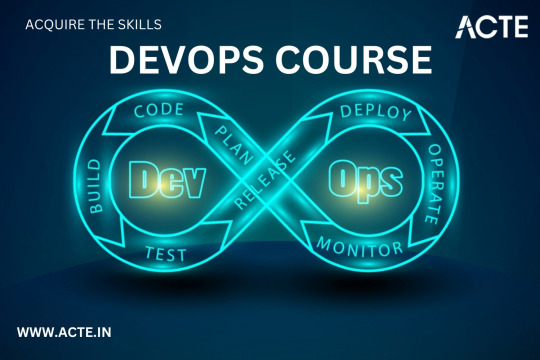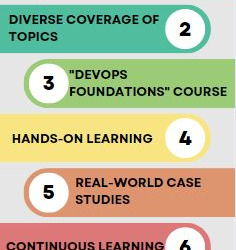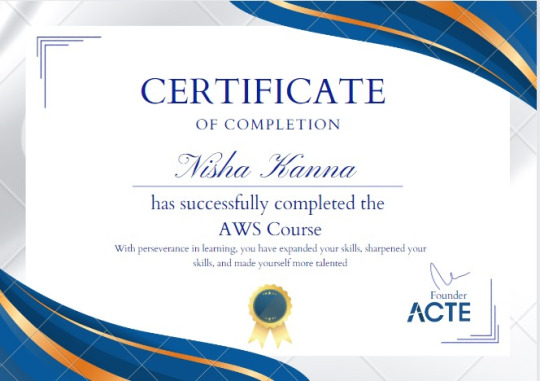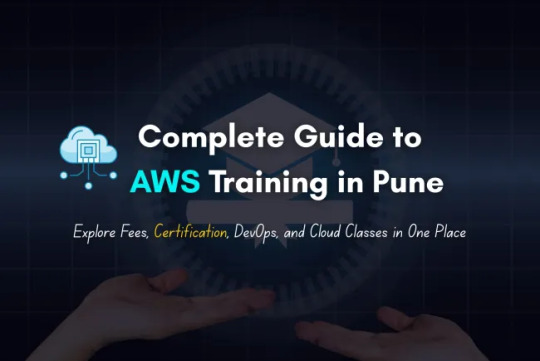#cloud computing courses for beginners
Explore tagged Tumblr posts
Text

#Pay After Placement#cloud computing courses online#cloud computing bootcamp#cloud computing courses#cloud computing training#cloud computing bootcamp with job guarantee#cloud computing courses for beginners#best cloud computing courses
0 notes
Text
#pay after placement#cloud computing courses#cloud computing training#cloud computing bootcamp with job guarantee#cloud computing courses for beginners
0 notes
Video
youtube
Introduction to Linux for DevOps: Why It’s Essential
Linux serves as the backbone of most DevOps workflows and cloud infrastructures. Its open-source nature, robust performance, and extensive compatibility make it the go-to operating system for modern IT environments. Whether you're deploying applications, managing containers, or orchestrating large-scale systems, mastering Linux is non-negotiable for every DevOps professional.
Why Linux is Critical in DevOps
1. Ubiquity in Cloud Environments - Most cloud platforms, such as AWS, Azure, and Google Cloud, use Linux-based environments for their services. - Tools like Kubernetes and Docker are designed to run seamlessly on Linux systems.
2. Command-Line Mastery - Linux empowers DevOps professionals with powerful command-line tools to manage servers, automate processes, and troubleshoot issues efficiently.
3. Flexibility and Automation - The ability to script and automate tasks in Linux reduces manual effort, enabling faster and more reliable deployments.
4. Open-Source Ecosystem - Linux integrates with numerous open-source DevOps tools like Jenkins, Ansible, and Terraform, making it an essential skill for streamlined workflows.
Key Topics for Beginners
- Linux Basics - What is Linux? - Understanding Linux file structures and permissions. - Common Linux distributions (Ubuntu, CentOS, Red Hat Enterprise Linux).
- Core Linux Commands - File and directory management: `ls`, `cd`, `cp`, `mv`. - System monitoring: `top`, `df`, `free`. - Networking basics: `ping`, `ifconfig`, `netstat`.
- Scripting and Automation - Writing basic shell scripts. - Automating tasks with `cron` and `at`.
- Linux Security - Managing user permissions and roles. - Introduction to firewalls and secure file transfers.
Why You Should Learn Linux for DevOps
- Cost-Efficiency: Linux is free and open-source, making it a cost-effective solution for both enterprises and individual learners. - Career Opportunities: Proficiency in Linux is a must-have skill for DevOps roles, enhancing your employability. - Scalability: Whether managing a single server or a complex cluster, Linux provides the tools and stability to scale effortlessly.
Hands-On Learning - Set up a Linux virtual machine or cloud instance. - Practice essential commands and file operations. - Write and execute your first shell script.
Who Should Learn Linux for DevOps? - Aspiring DevOps engineers starting their career journey. - System administrators transitioning into cloud and DevOps roles. - Developers aiming to improve their understanding of server environments.
***************************** *Follow Me* https://www.facebook.com/cloudolus/ | https://www.facebook.com/groups/cloudolus | https://www.linkedin.com/groups/14347089/ | https://www.instagram.com/cloudolus/ | https://twitter.com/cloudolus | https://www.pinterest.com/cloudolus/ | https://www.youtube.com/@cloudolus | https://www.youtube.com/@ClouDolusPro | https://discord.gg/GBMt4PDK | https://www.tumblr.com/cloudolus | https://cloudolus.blogspot.com/ | https://t.me/cloudolus | https://www.whatsapp.com/channel/0029VadSJdv9hXFAu3acAu0r | https://chat.whatsapp.com/D6I4JafCUVhGihV7wpryP2 *****************************
*🔔Subscribe & Stay Updated:* Don't forget to subscribe and hit the bell icon to receive notifications and stay updated on our latest videos, tutorials & playlists! *ClouDolus:* https://www.youtube.com/@cloudolus *ClouDolus AWS DevOps:* https://www.youtube.com/@ClouDolusPro *THANKS FOR BEING A PART OF ClouDolus! 🙌✨*
#youtube#Linux Linux for DevOps Linux basics Linux commands DevOps basics DevOps skills cloud computing Linux for beginners Linux tutorial Linux for#LinuxLinux for DevOpsLinux basicslinux commandsDevOps basicsDevOps skillscloud computingLinux for beginnersLinux tutorialLinux scriptingLinu#aws course#aws devops#aws#devpos#linux
1 note
·
View note
Note
Hello! Do you have any advice on getting into freelance coding or remote jobs in the field? I'm having trouble with my current endeavors of applications and my current customer service job isn't doing me well enough to want to stay, so I'm hoping for progress sooner rather than later. Anything helps, thank you!!
Hiya 🖤
Thanks for reaching out with your question about getting into freelance coding or remote jobs. Making a transition can be challenging, but with dedication and strategic steps, you can definitely progress in your career.
Firstly, consider specializing in a specific field of computer science rather than trying to learn everything. This will help you become an expert in a niche, making you more attractive to potential clients or employers.
The big thing to look at is (1) what specific job do you want? Don't know yet? That's the first thing you need to find out. (2) Found the job you want? Go to this website "roadmap.sh" and click the job title you want and look at the roadmap to become it. (3) Have an idea of what you need to learn? Now study :)
Here are some extra key pieces of advice:

Public Code Repositories
Showcase your coding skills by contributing to public repositories on platforms like GitHub, GitLab, or others. This allows potential employers to see your projects and assess your coding abilities.
Online Certifications
Earn certifications from reputable online courses like Freecodecamp, Codecademy, or SheCodes (if you're a woman). Displaying these certifications on your LinkedIn profile adds credibility for remote work or even freelance work because then clients will trust your skills more if it's back up with evidence (projects and/or certificates).
Links: "Massive List of Thousands of Free Certificates" / "The Udemy courses I use" / "FreeCodeCamp" / "Codecedemy" / "SheCodes" / "Udacity" / "Coursera" / "Google"
LinkedIn Profile
Revamp your LinkedIn profile to reflect your job title. Use a title that aligns with your dream job, and highlight your skills, certifications, and projects. You don't even need work experience OR do what a lot of my developer mates do have no work experience and set your "job" as a self-employed freelance developer... little cheat there~!
Links: "LinkedIn Career Explorer" / "Tips for speaking to/reaching out to Recruiter" / "Tips for Landing Your First Entry-Level Developer Job" / "Career Services for Web Development" / "The Talent Cloud Community: Careers Workshop"
Volunteering
Help someone out with a project for their business or whatever. For example, I helped a guy I met in a programming discord server build his portfolio page for free, but I care more about the experience. Search online for volunteer jobs with your dream job title e.g. Volunteer App Develope, but in your country would be better. The experience you can you can add to your LinkedIn. the project you work on you can add to your resume/experience.
Link: "SkilledUp Life"
Networking
Connect with professionals in your field on LinkedIn, even if you don't know them personally. Growing your network can open up opportunities and expose you to valuable insights. Events in person or online, servers (I found volunteer opportunities here), forums, Twitter (I found some mates on there), Instagram (another place I found developer friends). Networking can even help with building group projects~!
Link: "Tips for speaking to/reaching out to Recruiter"
Project Building
Work on both small and big projects to demonstrate your capabilities. Highlight these projects on your resume and portfolio.
Links: "Building projects after learning a new concept advice" / "Tips from learning using multiple resources" / "Tips on learning programming with ChatGPT" / "Harvard University Free IT Courses" / "The Udemy courses I use" / "Free Programming Books" / "Coding Advice for beginners" / "800 free Computer Science classes"
Online Presence
Share your learning progress and projects on various platforms like Tumblr, Twitter, Instagram, LinkedIn, or YouTube. Employers often appreciate candidates who actively showcase their work and commitment to learning. I made a post for Tumblr coding blogs:
Link: "Codeblr Blog Advice: 8 Blog Coding Post Ideas"
Good luck!!
#my asks#programming#coding#studyblr#codeblr#progblr#studying#comp sci#programmer#student#study life#coding study
43 notes
·
View notes
Note
Hello!
Checking out your blog, I noticed that you use C++ and seem quite knowledgeable on it, so I wanted to ask for your help (if it doesn't bother you!).
I've completed the two C++ courses in SoloLearn (which are quite superficial, but serve as good introductions, I believe), and I'm currently reading "The C++ Programming Language", by Bjarne Stroustrup. My issue is that I'm a bit afraid of not really understanding anything and/or being unable to write any functional code by myself. Therefore, I wanted to ask if you had any resources and/or tips that could be helpful for a beginner like me (the only language I've ever used before is HTML, and so I thought it was a good idea to go straight to C++ for the challenge of it xd).
It NEVER bothers me to blabber about code! :D
I LOVE C++
So first a long rant, and then my answer :3
C++ will probably forever be my favorite langauge.
But many do not like it, and it is actually somewhat rare to see as a language a professional uses.
Why? Because one should use a language for what it is good at.
And what is C++ good at?
Well, one of its neatest features is that it is a object oriented language.
It is also a language where you can create objects, but the language ITSELF is object oriented.
C++ is a derived class of the baseclass C
And it have the same philosophy as C
You can do ANYTHING!
You can EASILY write garanteed memory safe code in C++
You can write psydocode that have the same safety garantees as Rust.
Or you can go for 100% performsnce, dancing with void pointers and GOTOs!
Craft a class so it gets build, moved, removed used and works EXACTLY how you want it to! Down to the smallest details!
Write halfway object oriented and half functional!
If it can be done on a computer, it can be done in C++!
It may not be the language most often used. Often there are better languages for creating things
But knowing C++ means that you never again have to fully learn another language.
A C++ programmer KNOWS what a computer can do, so it is just a question of googeling the syntax for whatever language we are writing it in that day :D
Rant over. Answer time! :D
When I have to get a bit familiar with a new language I usually build a HTTP server :3
It is easy enough to look up for help, it means you work with everything you know
Slap it on a raspberry pie 0 or 3 depending on your wallet and bam! You have your own fileserver! :D
Connect a SSD into the raspberry pie 3 and bam, you now have your own cloud storage! :D
That is ALWAYS a useful thing :3
Keep it on your own network with a passwork and use MDNS to use it and it is 100% safe.
Because you piggybag on all the security wirless networks come with these days :3
8 notes
·
View notes
Text

Ubuntu is a popular open-source operating system based on the Linux kernel. It's known for its user-friendliness, stability, and security, making it a great choice for both beginners and experienced users. Ubuntu can be used for a variety of purposes, including:
Key Features and Uses of Ubuntu:
Desktop Environment: Ubuntu offers a modern, intuitive desktop environment that is easy to navigate. It comes with a set of pre-installed applications for everyday tasks like web browsing, email, and office productivity.
Development: Ubuntu is widely used by developers due to its robust development tools, package management system, and support for programming languages like Python, Java, and C++.
Servers: Ubuntu Server is a popular choice for hosting websites, databases, and other server applications. It's known for its performance, security, and ease of use.
Cloud Computing: Ubuntu is a preferred operating system for cloud environments, supporting platforms like OpenStack and Kubernetes for managing cloud infrastructure.
Education: Ubuntu is used in educational institutions for teaching computer science and IT courses. It's free and has a vast repository of educational software.
Customization: Users can customize their Ubuntu installation to fit their specific needs, with a variety of desktop environments, themes, and software available.
Installing Ubuntu on Windows:
The image you shared shows that you are installing Ubuntu using the Windows Subsystem for Linux (WSL). This allows you to run Ubuntu natively on your Windows machine, giving you the best of both worlds.
Benefits of Ubuntu:
Free and Open-Source: Ubuntu is free to use and open-source, meaning anyone can contribute to its development.
Regular Updates: Ubuntu receives regular updates to ensure security and performance.
Large Community: Ubuntu has a large, active community that provides support and contributes to its development.
4 notes
·
View notes
Text
Top GCP Certification For Beginners To Consider In 2024

In 2024, Google Cloud Platform (GCP) continues to dominate the cloud computing landscape with its robust set of services and solutions. For beginners looking to establish a career in cloud technology, obtaining GCP certifications is a strategic move. These certifications validate expertise in various GCP services, enhancing credibility and opening doors to lucrative career opportunities.
Why Choose GCP Certifications?
Career Advantages
GCP certifications are recognized globally and are highly valued by employers across industries. They validate skills in cloud architecture, data engineering, machine learning, and more, making certified professionals indispensable in today’s digital economy. With cloud adoption accelerating, companies are actively seeking GCP-certified professionals to drive their digital transformation initiatives.
Comprehensive Certification Options
Google offers a range of GCP certifications tailored to different job roles and skill levels:
1. Associate Cloud Engineer
The Associate Cloud Engineer certification is ideal for beginners aiming to demonstrate proficiency in deploying applications, monitoring operations, and managing enterprise solutions on GCP. It establishes a solid foundation in cloud architecture and infrastructure.
2. Professional Cloud Architect
For professionals aspiring to design and deploy dynamic and scalable GCP solutions, the Professional Cloud Architect certification is paramount. It covers advanced concepts such as security, compliance, and high availability.
3. Data Engineer
The Data Engineer certification focuses on designing and building data processing systems on GCP. It equips individuals with skills in data transformation, loading, and processing that are crucial in today’s data-driven enterprises.
4. Cloud Developer
The Cloud Developer certification validates proficiency in designing, building, and deploying applications on GCP. It emphasizes skills in application development, debugging, and performance optimization using Google technologies.
Preparation Tips for GCP Certification Exams
Achieving GCP certifications requires diligent preparation:
– Hands-on Experience
Practice using GCP services through labs and real-world scenarios to familiarize yourself with the platform’s features and functionalities.
– Official Study Materials
Utilize Google’s official training resources, including online courses, practice exams, and documentation, to gain comprehensive knowledge of exam objectives.
– Community Support
Engage with the GCP community through forums, study groups, and social media channels to exchange insights, tips, and best practices with fellow learners and professionals.
Career Growth and Opportunities
Earning GCP certifications not only enhances technical skills but also opens doors to a wide array of career opportunities:
High-demand Skills: Companies seek GCP-certified professionals for roles such as cloud architect, solutions engineer, and data analyst, offering competitive salaries and career advancement prospects.
Industry Recognition: GCP certifications validate expertise in cutting-edge cloud technologies, boosting credibility and marketability in the job market.
Continuous Learning: GCP certifications require ongoing learning and skill development, keeping professionals abreast of industry trends and innovations.
Conclusion
In conclusion, GCP certifications are indispensable for beginners looking to establish a successful career in cloud computing. Whether aiming to become an Associate Cloud Engineer, Professional Cloud Architect, Data Engineer, or Cloud Developer, these certifications validate expertise and open doors to lucrative career opportunities in 2024 and beyond.
2 notes
·
View notes
Note
liz do you have any security podcast recs?👀 and also, in general, some recs for someone who is now very interested in cybersecurity but knows basically nothing heh?
Hi there!
The main security podcast that I listen to is the SANS Internet Stormcenter podcast. The episodes are about 5 minutes long and are published every weekday morning. They're a good way to stay up to date on general things happening in the security world: big vulnerabilities, observed attack trends, patch Tuesday, that kind of stuff. That's the only security podcast that I listen to consistently, but people have told me that the Google Cloud Security Podcast is good, too. I mostly stay up to date with the industry via blogs, so if anyone is interested in that let me know & I can share a list!
As for the second part of your question, my main recommendation is to start exploring and see what kinds of things you're interested in! I'm on the tech side of security, so my recommendations will be centered around that. If you don't enjoy the tech side but are still interested in security, you can look into the governance/privacy/risk management/threat intelligence side of things. Some basic tech skills will always be helpful, though.
Off the top of my head, these are some main areas to start looking into:
Linux (how to use the GUI/CLI, understanding of how operating systems generally work)
Networking (OSI model, how the internet works)
programming/scripting - not required, but incredibly helpful. even just having a general understanding of the basics (variables, arrays, basic syntax) will be beneficial.
Generally, you'll need a solid understanding of IT stuff before you can get into the specifics of security. There are a lot of different areas of security, though, so start exploring and finding out which topics interest you!
YouTube is a good place to start learning these sorts of things. I highly recommend Professor Messer's channel. Start with the A+ playlists if you know nothing about tech, or start with the Network+ course if you feel like you could already be decent at tech support (you know the OSI model, you could probably build a computer, you know how to troubleshoot Windows). Check your school/local library to see if you get free access to LinkedIn Learning courses, there are some good ones there, too.
A good way to get started is to try a beginner-oriented CTF. I listed some resources in this post. Cyber FastTrack starts in October, usually, so if you're a college student in the U.S. you should keep an eye on that.
I hope that was helpful! let me know if you have any more questions :D
7 notes
·
View notes
Text
#cloud computing courses#cloud computing training#cloud computing bootcamp with job guarantee#cloud computing courses for beginners#best cloud computing courses#cloud computing bootcamp#cloud computing courses online
0 notes
Text
- Industry-relevant Curriculum

A data science bootcamp with job placement is a smart investment in your future, especially for those looking to break into the rapidly growing field of data science. One of the key reasons why these bootcamps are so valuable is because they offer an industry-relevant curriculum. This means that the course content is specifically designed to equip students with the skills and knowledge needed to excel in real-world data science roles.
#pay after placement#cloud computing courses#cloud computing training#cloud computing bootcamp with job guarantee#cloud computing courses for beginners#best cloud computing courses
0 notes
Text
Level Up Your Software Development Skills: Join Our Unique DevOps Course
Would you like to increase your knowledge of software development? Look no further! Our unique DevOps course is the perfect opportunity to upgrade your skillset and pave the way for accelerated career growth in the tech industry. In this article, we will explore the key components of our course, reasons why you should choose it, the remarkable placement opportunities it offers, and the numerous benefits you can expect to gain from joining us.

Key Components of Our DevOps Course
Our DevOps course is meticulously designed to provide you with a comprehensive understanding of the DevOps methodology and equip you with the necessary tools and techniques to excel in the field. Here are the key components you can expect to delve into during the course:
1. Understanding DevOps Fundamentals
Learn the core principles and concepts of DevOps, including continuous integration, continuous delivery, infrastructure automation, and collaboration techniques. Gain insights into how DevOps practices can enhance software development efficiency and communication within cross-functional teams.
2. Mastering Cloud Computing Technologies
Immerse yourself in cloud computing platforms like Amazon Web Services (AWS), Microsoft Azure, and Google Cloud Platform. Acquire hands-on experience in deploying applications, managing serverless architectures, and leveraging containerization technologies such as Docker and Kubernetes for scalable and efficient deployment.
3. Automating Infrastructure as Code
Discover the power of infrastructure automation through tools like Ansible, Terraform, and Puppet. Automate the provisioning, configuration, and management of infrastructure resources, enabling rapid scalability, agility, and error-free deployments.
4. Monitoring and Performance Optimization
Explore various monitoring and observability tools, including Elasticsearch, Grafana, and Prometheus, to ensure your applications are running smoothly and performing optimally. Learn how to diagnose and resolve performance bottlenecks, conduct efficient log analysis, and implement effective alerting mechanisms.
5. Embracing Continuous Integration and Delivery
Dive into the world of continuous integration and delivery (CI/CD) pipelines using popular tools like Jenkins, GitLab CI/CD, and CircleCI. Gain a deep understanding of how to automate build processes, run tests, and deploy applications seamlessly to achieve faster and more reliable software releases.
Reasons to Choose Our DevOps Course
There are numerous reasons why our DevOps course stands out from the rest. Here are some compelling factors that make it the ideal choice for aspiring software developers:
Expert Instructors: Learn from industry professionals who possess extensive experience in the field of DevOps and have a genuine passion for teaching. Benefit from their wealth of knowledge and practical insights gained from working on real-world projects.
Hands-On Approach: Our course emphasizes hands-on learning to ensure you develop the practical skills necessary to thrive in a DevOps environment. Through immersive lab sessions, you will have opportunities to apply the concepts learned and gain valuable experience working with industry-standard tools and technologies.
Tailored Curriculum: We understand that every learner is unique, so our curriculum is strategically designed to cater to individuals of varying proficiency levels. Whether you are a beginner or an experienced professional, our course will be tailored to suit your needs and help you achieve your desired goals.
Industry-Relevant Projects: Gain practical exposure to real-world scenarios by working on industry-relevant projects. Apply your newly acquired skills to solve complex problems and build innovative solutions that mirror the challenges faced by DevOps practitioners in the industry today.

Benefits of Joining Our DevOps Course
By joining our DevOps course, you open up a world of benefits that will enhance your software development career. Here are some notable advantages you can expect to gain:
Enhanced Employability: Acquire sought-after skills that are in high demand in the software development industry. Stand out from the crowd and increase your employability prospects by showcasing your proficiency in DevOps methodologies and tools.
Higher Earning Potential: With the rise of DevOps practices, organizations are willing to offer competitive remuneration packages to skilled professionals. By mastering DevOps through our course, you can significantly increase your earning potential in the tech industry.
Streamlined Software Development Processes: Gain the ability to streamline software development workflows by effectively integrating development and operations. With DevOps expertise, you will be capable of accelerating software deployment, reducing errors, and improving the overall efficiency of the development lifecycle.
Continuous Learning and Growth: DevOps is a rapidly evolving field, and by joining our course, you become a part of a community committed to continuous learning and growth. Stay updated with the latest industry trends, technologies, and best practices to ensure your skills remain relevant in an ever-changing tech landscape.
In conclusion, our unique DevOps course at ACTE institute offers unparalleled opportunities for software developers to level up their skills and propel their careers forward. With a comprehensive curriculum, remarkable placement opportunities, and a host of benefits, joining our course is undoubtedly a wise investment in your future success. Don't miss out on this incredible chance to become a proficient DevOps practitioner and unlock new horizons in the world of software development. Enroll today and embark on an exciting journey towards professional growth and achievement!
10 notes
·
View notes
Text
AWS Training: Your Ticket to Thrive in the Cloud Computing Revolution!
In’s rapidly evolving technological landscape, cloud computing has emerged as a game-changer, revolutionizing the way businesses operate and individuals engage with digital services. Among the numerous cloud service providers, Amazon Web Services (AWS) stands tall as a pioneer and leader in the field. Understanding the impact of AWS and gaining proficiency in its functionalities can be your passport to success in the world of cloud computing. This article aims to shed light on the significance of AWS training and how it can empower you to navigate the cloud computing revolution.

A Pattern Shift in Cloud Computing
Embracing AWS as a Leading Cloud Service Provider
As the demand for cloud-based solutions escalates, AWS has solidified its position as the go-to platform for individuals and organizations across the globe. With a versatile range of services encompassing computing power, storage, networking, databases, and more, AWS offers an unmatched infrastructure to support diverse business needs. By undertaking AWS training, you can unlock the full potential of these services, harnessing the capabilities of AWS to drive innovation, scalability, and cost optimization for your projects.
Mastering the Fundamentals: Essential Concepts and Services
Before delving into the vast AWS ecosystem, it is crucial to build a strong foundation by understanding the fundamental concepts and services. AWS training provides an organized curriculum that guides you, step by step, through the basics of cloud computing, AWS architecture, and key services like Amazon Elastic Compute Cloud (EC2), Simple Storage Service (S3), and Relational Database Service (RDS). By familiarizing yourself with these core components, you gain the necessary knowledge and skills to embark on your cloud computing journey confidently.
Navigating the AWS Training Journey
Comprehensive Learning Paths: From Newbie to Expert
AWS offers a diverse range of training options tailored to meet the needs of individuals at various skill levels. Whether you are a beginner looking to understand the basics or an experienced professional seeking to specialize in a particular domain, AWS training has got you covered. With structured learning paths designed for architects, developers, data engineers, and more, you can embark on a journey that aligns with your career aspirations. The systematic progression ensures that you acquire the right knowledge, hands-on experience, and certifications to excel in your chosen field.
Hands-On Labs and Real-World Scenarios: Learning by Doing
One of the most effective ways to master AWS is through hands-on experience, and AWS training excels in providing just that. By incorporating practical labs and real-world scenarios, training courses simulate the challenges you are likely to face in actual job roles. This experiential learning approach equips you with the ability to apply theoretical knowledge in practical scenarios, fostering a deeper understanding of AWS services and their practical implications. Furthermore, the training platform provides a safe environment for experimentation, enabling you to explore and experiment with different AWS configurations without the fear of disrupting production systems.
Expert Guidance and Community Support: Learning Together
AWS training goes beyond self-paced courses, offering opportunities for interaction and collaboration with experts and peers. Instructors with rich industry experience provide guidance and support throughout your learning journey, ensuring that you receive the necessary expertise to overcome hurdles and gain insights from their practical wisdom. Additionally, AWS training fosters a vibrant community where learners can actively engage, share experiences, and seek advice from fellow enthusiasts. This sense of camaraderie and shared learning creates a supportive ecosystem that enhances your growth and enriches your AWS training experience.

AWS Certifications: Showcasing Your Proficiency
Recognized Industry-Standard Certifications
To validate your AWS expertise and stand out in a competitive job market, AWS offers a comprehensive certification program. These industry-recognized certifications are a testament to your proficiency in various AWS services and demonstrate your commitment to continuous learning. By obtaining AWS certifications, you gain a competitive edge, making you an attractive candidate for job opportunities that require cloud computing skills. From foundational certifications like AWS Certified Cloud Practitioner to specialized roles like AWS Certified Solutions Architect or AWS Certified Machine Learning Specialist, AWS training equips you with the knowledge and credentials to showcase your capabilities effectively.
The cloud computing revolution is here to stay, and harnessing the power of AWS can unlock a world of opportunities. By investing in AWS training at ACTE institute, you equip yourself with the skills, knowledge, and certifications needed to thrive in this transformative landscape. From mastering the fundamental concepts to navigating the vast AWS ecosystem, the comprehensive learning paths, hands-on labs, expert guidance, and industry-recognized certifications pave the way for your success. Embrace the cloud computing revolution, embark on your AWS training journey, and witness firsthand how it propels you towards professional excellence in the ever-evolving world of cloud computing.
10 notes
·
View notes
Text
Future of data science?
Exciting developments await the future of data science as it evolves. Data scientists can expect to see greater integration of artificial intelligence (AI) and machine learning, facilitated by automation and AutoML, which will make data analysis more accessible. Proficiency in big data and real-time analytics will be crucial as the volume and complexity of data continue to expand. Additionally, ethical considerations such as privacy protection, bias detection, and responsible AI implementation will remain important focal points. Furthermore, data science will involve increased interdisciplinary collaboration that bridges technical expertise with domain knowledge and ethics.
Explainable AI will be necessary for the development of trust and compliance, while edge and IoT analytics will cater for the increased demand of IoT devices. In this way, data visualisation and storytelling skills will still be vital. Data scientists will need to adapt as organisations shift to hybrid and multi-cloud environments. This field will require continuous learning for success. The next quantum leap for data science with quantum computing. Customization and personalization will also define data science; this will deliver specific solutions for particular business needs. In the data-driven era, it’s the data scientists that will excel.
If you are considering preparing for this promising future, Edure provides a wide variety of comprehensive data science courses designed for students of all skill levels. Edure has a comprehensive curriculum that includes introductory courses in basic data science concepts, tools and techniques for beginners and advanced programs targeted for experienced professionals. These courses will give you the knowledge and the skills that will enable you to succeed in the data-driven world of tomorrow. Therefore, whether a beginner or an expert desiring to remain up to date in data science, Edure courses are valuable for launching into or deepening one’s involvement in this promising domain.
For more information contact as
Edure | Learn to Earn
Aristo Junction, Thampanoor,
Thiruvananthapuram, Kerala , 695001
+91 9746211123 +91 9746711123
2 notes
·
View notes
Text
Actually heck it I have to add some resources here that aren't just in the tags LMAO
1.
Free 7 day trial! And pretty cheap paid version as well.
Lots and LOTS of videos and practice for many different coding types!
2.
When I'm having troubles figuring out a function (or I forgot how basic stuff works LMAO), this is my go-to.
Expert documentation on so many details of so many coding languages, and examples as well!
3.
When it comes to more specific problems, I usually look here. They've got allll kinds of things here, and very good explanations!
4.
Where I go for so many questions LMAO
Remember, if you have a coding question, someone else has already had that same question and gotten an answer on StackOverflow somewhere XD
5.
This is THE Coding IDE we use in my classes. It's free. It's good. It works with Github and has a billion plugins for different coding languages and other neat things.
6.
Speaking of github
Here is THE code sharing website!
9.
This place has really good docs as well
10.
Another coding learning website!
Even beyond all of this: just going to Youtube and looking up something like "javascript tutorial for beginners" brings up a billion videos that you can watch. There are SO many resources out there!! You can just learn! Right now!
There are a lot of very good resources and tutorials for making video games as well! Many engines don't require too too much coding knowledge, and you can absolutely start messing around with things without having any background in it!
Some more resources for game dev (that I got from PirateSoftware's discord server LMAO):
Read this if you've ever wanted to make a game. Hugely inspirational
A database of video game engines!
it would appear I hit the link limit but there are so many resources out there!!
For video games, I have to mention there being a ton of resources for visual novels in particular
If anyone else wants to add more coding resources I would love that 👀
There's always more to learn, after all XD
please learn how to code
like, if you're bored today, and not doing anything,
learn a little bit of coding please
#sorry if some of this isn't worded the best I got sleepy but still wanted to finish it LMAO#also sorry I have no idea how tumblr formatting works I am but a mobile user LMAO
34K notes
·
View notes
Text
Is Full Stack Development Ready for Quantum Computing?
In the rapidly evolving world of technology, Full Stack Development has become a must-have skill for developers seeking to build scalable and dynamic applications. But as quantum computing moves closer to real-world applications, a question naturally arises: Is Full Stack Development ready for the quantum leap?
To explore this, we need to look at the state of full stack technologies today, the nature of quantum computing, and how developers — especially those honing their skills through quality programs like the Best Full Stack Course in Pune — can prepare for a potential quantum future.
Understanding the Landscape: Full Stack Meets Quantum
Full Stack Development refers to the ability to work on both the front-end and back-end of a web application. It includes knowledge of:
Front-end technologies like HTML, CSS, JavaScript
Back-end technologies such as Node.js, Java, Python, and frameworks like Spring Boot or Express.js
Database management (SQL, NoSQL)
APIs and version control (e.g., Git)
In contrast, Quantum Computing operates on the principles of quantum mechanics. Instead of bits, it uses qubits, which can exist in multiple states simultaneously. This allows quantum computers to perform complex computations exponentially faster than classical computers.
Clearly, the two are fundamentally different. But are they mutually exclusive? Or can full stack developers find ways to work with, or even build for, quantum environments?
The Reality Check: Where Things Stand
Quantum computing is still in its experimental phase. Real-world applications are limited, and most systems that support quantum development use hybrid models — classical front-ends with quantum-powered back-ends.
For full stack developers, this means:
Quantum is not replacing traditional full stack anytime soon.
But it may complement it, especially in areas like cryptography, big data processing, AI/ML, and optimization.
Those taking up industry-recognized training, like the Best Java Certification Course in Pune, are already learning the foundations necessary to adapt to any paradigm — including quantum.
Skills That Will Remain Relevant
Even as quantum computing evolves, core skills from traditional full stack development will remain crucial. These include:
Proficiency in JavaScript and Java – Often used for integrating interfaces and logic layers.
Problem-solving skills – Quantum computing introduces abstract challenges that require structured thinking.
API integration – Quantum systems are often accessed through APIs; understanding REST or GraphQL is vital.
Cloud platform knowledge – Quantum computing services are primarily accessed via cloud-based platforms.
Whether you’re enrolled in the Best Full Stack Course in Pune or a Java specialization program, the foundations you're building today will prepare you for future-tech integrations.
How Full Stack Developers Can Prepare for Quantum Integration
Here are some actionable steps full stack developers can take today to prepare for the quantum future:
Learn the basics of quantum computing – Platforms like IBM Qiskit or Microsoft's Quantum Development Kit offer beginner-friendly resources.
Keep up with cloud quantum services – Azure Quantum and Amazon Braket provide APIs that allow classical front-end developers to run quantum algorithms.
Build hybrid applications – Try connecting traditional web applications to quantum algorithms via RESTful APIs.
Understand quantum-safe cryptography – Security protocols will evolve as quantum breaks traditional encryption.
Opportunities Ahead: Quantum in the Stack?
It’s unlikely that full stack developers will be writing direct quantum code (in Q#, Qiskit, etc.) in the near future. However, developers will need to understand how to integrate classical web systems with quantum processors.
Here’s how quantum might enter the full stack world:
Front-End – No major changes, but interfaces may need to interpret and display quantum results.
Back-End – Integration with quantum APIs for specialized tasks (e.g., high-level optimization).
Security Layer – Incorporating quantum-safe encryption and identity protocols.
Courses designed for comprehensive learning — like the Best Full Stack Course in Pune — already provide exposure to the kinds of architecture and logic needed to make this integration possible.
Why Java Still Matters in a Quantum World
Java might not be a quantum programming language, but its robustness, portability, and enterprise acceptance make it essential for building secure, scalable systems that might interface with quantum components. If you’re pursuing the Best Java Certification Course in Pune, you’re equipping yourself with the tools necessary to build the “glue” between classic and quantum systems.
Java’s role will likely be:
Facilitating API communication with quantum services
Running traditional business logic securely
Building scalable back-end infrastructures
So while you might not be writing quantum algorithms in Java, you’ll be building the applications that run them efficiently.
Conclusion: Bridging the Gap
Full stack developers won’t be rendered obsolete by quantum computing — quite the opposite. As the industry evolves, they’ll become even more essential in bridging the classical-quantum divide. Whether through RESTful APIs, secure cloud platforms, or hybrid architectures, full stack developers will help operationalize quantum capabilities.
To stay ahead, it's crucial to invest in holistic learning. Enrolling in theBest Full Stack Course in Pune or enhancing your backend proficiency via the Best Java Certification Course in Pune can give you a significant edge. The quantum future might still be emerging, but with the right skills, you'll be more than ready when it arrives.
0 notes
Text
Kickstart Your Cloud Journey with AWS Training in Pune

Cloud computing is reshaping the way organizations operate—and at the heart of this revolution is Amazon Web Services (AWS). If you're looking to build a future-proof career in cloud technology, enrolling in AWS Cloud Training in Pune is your first step toward success. With expert mentorship and hands-on training, WebAsha Technologies helps you gain the skills needed to thrive in today’s cloud-driven job market.
Why AWS Skills Are Essential and Beyond
Amazon Web Services (AWS) leads the cloud services industry, offering over 200 fully featured services for computing, storage, database, machine learning, and more. As cloud adoption accelerates across sectors, the demand for skilled AWS professionals continues to grow.
Top Benefits of Learning AWS:
High-paying job opportunities
Versatile roles across industries
Scalable skills for modern IT careers
Foundation for DevOps and cloud-native development
Why Choose WebAsha Technologies for AWS Training Programs in Pune?
At WebAsha Technologies, we are committed to turning learners into cloud professionals. Our AWS Cloud Training in Pune is designed for both beginners and working professionals who want to upskill or transition into cloud computing.
Key Features of Our AWS Training:
Certified and Experienced Instructors
Hands-on Practice with Real-Time Projects
Dedicated Lab Access for Cloud Experiments
Updated Curriculum Aligned with AWS Certification Tracks
Placement Support and Career Guidance
Who Should Enroll in AWS Cloud Training?
Our AWS programs are suitable for:
Fresh Graduates aspiring to enter the IT sector
IT Professionals looking to upgrade their skills
System Admins and Network Engineers
Software Developers and DevOps Engineers
Entrepreneurs planning to deploy scalable applications
What You Will Learn in the AWS Training Program
Our training covers everything you need to become cloud-ready and certification-ready.
Course Modules Include:
Introduction to Cloud Computing & AWS Overview
EC2, S3, and EBS – AWS Compute and Storage Services
VPC, Subnetting, and Network Security
IAM – Identity and Access Management
Elastic Load Balancer & Auto Scaling
RDS, DynamoDB – Database Services
CloudFormation, CloudWatch & Billing
Serverless Computing with AWS Lambda
Practice Tests & Real-Time Case Studies
Career Outcomes After AWS Training
After completing your training with us, you'll be prepared to pursue certifications like:
AWS Certified Cloud Practitioner
AWS Certified Solutions Architect – Associate
AWS Certified Developer – Associate
AWS Certified DevOps Engineer – Professional
Conclusion: Begin Your AWS Cloud Journey with Confidence
Don’t wait for opportunities—create them by building cloud expertise. The AWS Cloud Training in Pune by WebAsha Technologies is your launchpad into one of the most in-demand fields in the world. With expert trainers, real-world projects, and career support, you’ll be fully equipped to succeed in today’s competitive tech landscape.
0 notes